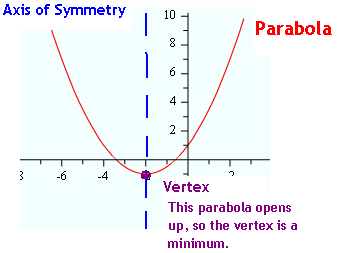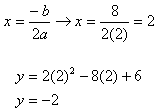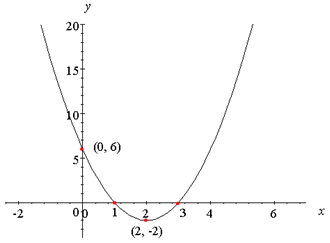Foundations
| Site: | Gladwin |
| Course: | Michigan Algebra I Sept. 2012 |
| Book: | Foundations |
| Printed by: | Guest user |
| Date: | Thursday, January 15, 2026, 12:32 PM |
Description
Foundations
Introduction

Graphing a Quadratic
- Find a, b, and c of the equation.
- Check if a > 0 or a < 0 to decide if the graph opens up (a > 0) or down (a < 0).
- Find the vertex. This is the minimum or maximum point of the parabola. The x-coordinate can be found by the equation
 . Once found, substitute this value into the original equation to find the value of y. These will be the (x,y) coordinates of the vertex.
. Once found, substitute this value into the original equation to find the value of y. These will be the (x,y) coordinates of the vertex. - Find the y-intercept by substituting 0 in for x in the equation.
- Find the x-intercepts by substituting y = 0 and solving the quadratic equation. Use either the quadratic formula, completing the square, or put the equation in factored form to solve for x.
Example
Step 1. Determine a, b and c and decide if the graph will open up or down.
a = 2, b= -8, and c = 6. Because a is positive, the graph will open upward.
Step 2. Find the vertex.

The vertex is at the point (2, -2)
Step 3. Find the x-intercepts.
To find the x-intercepts, substitute 0 in for the y and solve. This was covered completely in the solving book.
2x2 ? 8x + 6 = 0
2(x2 - 4x +3) = 0
2(x - 1)(x -3) = 0
x = 1 or x = 3
The x-intercepts are (1,0) and (3,0).
Example Continued
To find the y-intercept, substitute 0 in for x and solve.
y = 2(0)2- 8(0) + 6 = 6.
The graph crosses the y-axis at the point (0,6).
Step 5. Plot all points and connect in a "U" shaped curve to create a graph.
The graph of y = 2x2 ? 8x + 6 is:

Video Lesson
Interactive Activities
Graphing Quadratics #1
Graphing Quadratics #2
Graphing Quadratics #3
Guided Practice
Guided Practice #1
Guided Practice #2
Guided Practice #3
Sources
Embracing Mathematics, Assessment & Technology in High Schools; A Michigan Mathematics & Science Partnership Grant Project
Holt, Rinehart & Winston, "Quadratic Functions." http://my.hrw.com/math06_07/nsmedia/homework_help/alg2/alg2_ch05_02_homeworkhelp.html (accessed 8/18/2010).
Holt, Rinehart & Winston, "Quadratic Functions and Equations." http://my.hrw.com/math06_07/nsmedia/lesson_videos/alg1/player.html?contentSrc=6373/6373.xml (accessed 8/18/2010).
Holt, Rinehart & Winston, "Quadratic Functions and Equations." http://my.hrw.com/math06_07/nsmedia/homework_help/alg1/alg1_ch09_04_homeworkhelp.html (accessed 8/18/2010).
Hot Math, "Graphing Quadratic Equations." http://hotmath.com/hotmath_help/topics/graphing-quadratic-equations.html (accessed 07/25/2010).
Mathematics Education Department, University of Georgia. "Intermath: Dictionary." http://intermath.coe.uga.edu/dictnary/related.asp?termid=414 (accessed 07/15/2010).
Zona Land, "Polynomial Function of the Second Degree." http://zonalandeducation.com/mmts/functionInstitute/polynomialFunctions/graphs/degree2PolynomialFunction.html (accessed 07/25/2010).